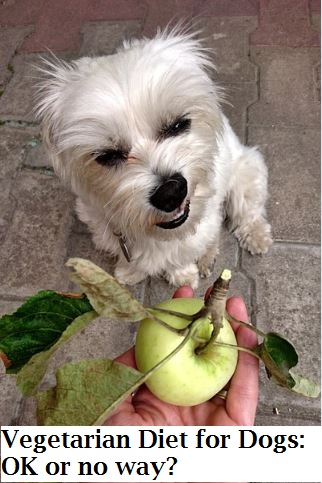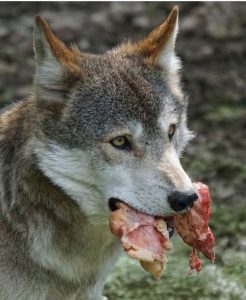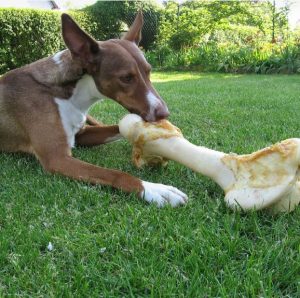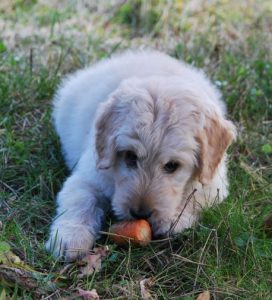If you are on a vegetarian or vegan diet, you may be wondering at some point “Can I feed my dog a vegan diet too?” While dogs may be interested in eating green beans, carrots and peas, given the choice, dogs are particularly drawn to a meat-based diet. If we carefully look at the way a dog’s body is designed, we can get some hints as to what type of diet they were built for. Many veterinarians and veterinary nutritionists are increasingly concerned about the growing trend of vegans and vegetarians trying to let their dogs and cats join their dietary habits; however, doing so can even cause problems that may even lead to some serious nutritional deficiencies.
 A Subject of Debate
A Subject of Debate
First off, are dogs carnivores or omnivores? This remains a strong subject of debate. On one hand we have those who strongly believe that dogs are carnivores.
Since wolves are the dog’s ancestors and dogs and wolves share the same number of chromosomes, aligned in 39 pairs, it comes quite natural to conclude that dogs must be carnivores just like wolves are. Even by looking at the dog, one may easily see a body designed for eating meat with those sharp canines.
On the other hand, we have those who believe that dogs must be omnivores. While wolves are the dog’s ancestors, it must be remembered that there are likely 15,000 (or more) years separating dogs from wolves. At some point, when dogs separated from wolves, they must have undergone significant changes. One of them includes the ability to digest starch, as reported in a study.
These changes may cause many to assume that dogs must be omnivores, considering that dogs can survive on a diet with no meat.
As seen, both sides of the debate sort of make sense, but which side is true? First, it may help to get a closer insight into the definition of certain terms.
 A Closer Insight
A Closer Insight
So let’s define a bit more the terms carnivores and omnivores.. When it comes to carnivores, the term is used to depict animals that derive their energy and nutrients from a diet mainly or exclusively composed of meat, bones, internal organs and animal tissues.
Notice how the above definition contains the words “exclusively” in bold letters. Usage of this emphasis is to make an important distinction between obligate carnivores and regular carnivores. What’s the difference between the two? Here are some quick definitions.
Some animals are classified as obligate carnivores which means that they entirely depend on eating animal flesh. Examples of obligate carnivores include cats, lions and tigers. Obligate carnivores (also known as true carnivores) are not equipped with the correct type of physiology to digest vegetable matter and will suffer serious consequences if they do not eat meat. For instance, if a cat’s diet lacks vitamin A, arachidonic acid and taurine, which are only found in meat, cats risk getting seriously sick.
Then we have animals that are classified as facultative carnivores meaning that, on top of eating meat, they also consume non-animal foods. And then, we have omnivores, animals who consume both animal and non-animal food. Examples of ominivores include pigs, chickens and humans. Omnivores are capable of consuming both vegetable manner and meat.
What Exactly are Dogs?
So are dogs carnivores or omnivores? Or perhaps somewhere in between? If we look closely at dogs, we will see that their anatomy, physiology and mind are designed for eating meat. Dogs are equipped with teeth meant for tearing flesh and grinding bone. Their eating style also reflects the eating style of carnivores: rip a chunk of meat off and devour it, letting the gastric juices take care of the rest.
Even the gut transit time of dogs reflect those of carnivores. Not to mention their behavior, dogs are geared to follow the predatory sequence (scan, stalk, chase, grab-bite, kill-bite, dissect and consume). Even though the sequence is truncated in some dogs who were selectively bred for herding, the tendency to chase is still alive nonetheless.
However, let’s not forget about domestication. A key finding of the study conducted by the University of Uppsala in Sweden found that dogs have between 4 and 30 copies of the gene that codes for amylase, the special enzyme that’s responsible for breaking down starch. Wolves, on the other hand, have only two copies of this gene.
So where does this put dogs? Are dogs omnivorous since they can digest starch? First of all, in humans, amylase is produced in saliva, hence the saying “the digestive process starts in the mouth.” In dogs instead amylase is expressed only in the pancreas (Axelesson et al, 2013) .
Secondly, we don’t know yet how many copies of these genes need to be present to qualify an animal as omnivorous, and therefore the answer remains unclear. We do know though that dogs do not thrive on a high starch diet as it has caused obesity and chronic disease. As Doug Kneuven says it in the quote below, goes a long way.
“To say that because dogs can digest starch proves that they thrive on a high starch diet is like aserting that because people can process ethanol and glucose we thrive on a diet rich in rum and cookies!” ~Doug Knueven
 About Vegetarian Diets
About Vegetarian Diets
It is tempting for dog owners to try to feed dogs a vegetarian diet, either because of personal values, ethical considerations or religious beliefs, but these may harm dogs if these vegetarian diets do not meet some important requirements. While it is possible to feed a vegetarian diet, it’s important that it is at least supplemented with synthetic sources of essential nutrients.
Commercial vegetarian diets must state somewhere on their bags whether they are complete and provide all the essential nutrients dogs need.
The problem with vegetarian diets is that they tend to lack essential nutrients and may therefore cause deficiencies. Consider that puppies are at most risk for nutritional deficiencies than adult dogs and dogs on vegetarian diets may require more frequent screenings to evaluate health.
If you are considering a vegetarian diet for your dog, the most important word here is “careful planning” so to ensure you meet your dog’s nutritional requirements. Generally, vegetarian diets that incorporate protein from eggs or dairy are less risky than diets based solely only on proteins from plants, points out veterinary nutritionist Dr.Cailin R. Heinze. Homemade vegetarian diets should therefore be reviewed by a veterinary nutritionist such as a DACVN Diplomat of the American College of Veterinary Nutrition.
“As a veterinary nutritionist, I use meat-free diets quite a bit to help manage various health concerns. The challenge is that designing these diets is not the easiest thing to do.”~Dr.Cailin R. Heinze.
References:
- Canine Nutrigenomics – The New Science of Feeding Your Dog for Optimum Health, By W. Jean Dodds, DVM, Diana Laverdure
- Cummings Veterinary Medical Center at Tufts University, Vegan Dogs – A healthy lifestyle or going against nature?


 A Subject of Debate
A Subject of Debate A Closer Insight
A Closer Insight
 About Vegetarian Diets
About Vegetarian Diets